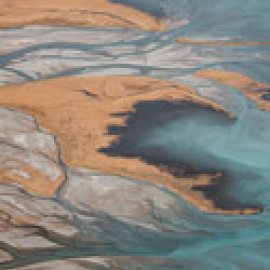Revelations by Salt
-
English
-
ListenPause
[intro music, ocean sounds]
Welcome to World Ocean Radio…
I’m Peter Neill, Founder of the World Ocean Observatory.
Revelation comes in unexpected places. Some years ago, in an effort to accumulate a fulsome catalogue of educational resources relating to ocean science, I came upon a curriculum created by a group of secondary school teachers in Africa that was, in and of itself, revelation in that it seemed unique among a plethora of western versions produced by educators in the United States and Europe.
As I looked through, several other realizations occurred. First, as it was illustrated, it portrayed each lesson in the context of the community in which the students presumably lived – coastal villages primarily, where everyone was African instead of the Caucasian inhabitants of the western versions. This seems absurdly obvious, but it suggested the conditioning of my own experience and bias toward western science, hence western perspective and western participation, to which I was culturally accustomed. Indeed, all the children, all the villagers were black, not a colonist in sight, and there was in this simple fact: revelation.
There was a section devoted to salt. In a western classroom, the explanation might begin with the periodic table, to describe salt as a combination of sodium and chloride, elements bonded to create a compound to be incorporated over time into utility. In this case, however, the lesson began with the role of salt as flavor enhancement of food, a way to preserve fish and meat, a source of work, trade, and financial support by its production. Salt was presented as a community phenomenon first, familiar to every student before the lesson even began as an element in the social organization of health and home—a revelation by reversal of perspective.
The practicality of such an approach contrasts with the abstraction and complexity of chemistry, the understanding of science and its principles as a starting point for learning. We learn heat by accidentally touching the stove, pain by biting the tongue, cold by plunging into the ocean. Experience becomes the starting point for explanation and understanding. Today, experience as a formal educational concept enjoys a re-affirmation, taking students outdoors to encounter the environment as a place for direct learning understanding what it is and how it works. Statistics reveal that formal didactic presentation in a formal didactic space does not necessarily best affirm either rational or emotional understanding of what is taught. The Periodic Table is not the only way to teach; memorization is not the only way to learn. To understand the cosmos, first step outside and view the night sky.
One of the illustrations in this small publication was of local, coastal wetlands and shallows wherein salt was being harvested: flats of sea water in the unrelenting sun. It suggested an experiment of my own: several sheet pans into which I poured ocean water taken from just off-shore from where I live in Maine. I placed the pans in the sun and went about my business until I returned to find the salt water evaporated and my pans gritty with the natural residue, the sea salt that I gathered up into a small dish for the dinner table, personally harvested, a gift by process, a natural revelation sprinkled to flavor the food on my table. A gift of from the ocean.
How do we learn? What is science but degrees of observation? What is Nature but a compendium of opportunity that we must protect and sustain through sustainability and respect? Why would we despoil such a gift? Why would we take it for granted? Why would we not honor the simplicity and generosity of salt that is but one such contribution to our livelihood hidden, but so easily revealed and extracted from the sea around us?
That we can explain something so essential and miraculous by a method so simple and true is a revelation: teaching and learning the wisdom of Nature, from the salt of the Earth.
We will discuss these things, and more, in future editions of World Ocean Radio.
WORLD OCEAN RADIO IS DISTRIBUTED BY THE PUBLIC RADIO EXCHANGE AND THE PACIFICA NETWORK, FOR USE BY COLLEGE AND COMMUNITY RADIO STATIONS WORLDWIDE. FIND US WHEREVER YOU LISTEN TO PODCASTS, AND AT WORLD OCEAN OBSERVATORY DOT ORG, WHERE THE FULL CATALOG OF MORE THAN 700 RADIO EPISODES IS SEARCHABLE BY THEME.
[outro music, ocean sounds]
Discovery of a curriculum developed for coastal Africa some years ago sent World Ocean Radio host Peter Neill on a journey of discovery and revelation about salt as a construct to be observed, understood, and taught. A western scientific perspective might teach students about salt from a chemistry-led lesson, whereas the African curriculum taught salt as serving a role in the enhancement of and as means to preserve food, the harvesting for work, as way of life, and as financial support by its production and harvest. This latter perspective is not first and foremost chemistry-led but community-focused, with methods of teaching and learning through the wisdom of Nature. What might we learn by diving in to teaching and learning a different way?
About World Ocean Radio
World Ocean Radio is a weekly series of five-minute audio essays available for syndicated use at no cost by college and community radio stations worldwide. Peter Neill, Director of the World Ocean Observatory and host of World Ocean Radio, provides coverage of a broad spectrum of ocean issues from science and education to advocacy and exemplary projects.
World Ocean Radio
15 Years, 750 Episodes
Ocean is climate
Climate is ocean
The sea connects all things
- Login to post comments



